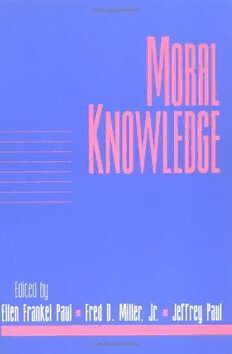
Moral Knowledge: Volume 18, Part 2 (Social Philosophy and Policy) (v. 18) PDF
382 Pages·2001·19.079 MB·English
Most books are stored in the elastic cloud where traffic is expensive. For this reason, we have a limit on daily download.
Preview Moral Knowledge: Volume 18, Part 2 (Social Philosophy and Policy) (v. 18)
Description:
The essays in this volume address some of the most enduring questions involved in the search for moral knowledge. Can morality be founded upon facts about human nature, social agreement, volition, subjective preference, a priori reasoning, intuition, or some other basis? Is morality knowable in any objective sense that would make it universal and, therefore, binding on humans in all times, places, and circumstances? Or, rather, is morality inherently subjective, culture bound, or more radically still, uniquely determined by each individual for that individual? Is there an answer to those who maintain that it is misguided even to think in terms of moral knowledge, on the grounds that moral utterances are expressions of feelings or attitudes rather than claims that can be known to be true or false?
See more
The list of books you might like
Most books are stored in the elastic cloud where traffic is expensive. For this reason, we have a limit on daily download.
